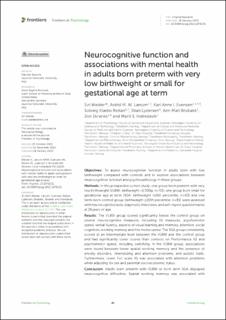| dc.description.abstract | Objectives: To assess neurocognitive function in adults born with low birthweight compared with controls and to explore associations between neurocognitive function and psychopathology in these groups.
Methods: In this prospective cohort study, one group born preterm with very low birthweight (VLBW: birthweight <1,500 g, n = 53), one group born small for gestational age at term (SGA: birthweight <10th percentile, n = 63) and one term-born control group (birthweight ≥10th percentile, n = 81) were assessed with neurocognitive tests, diagnostic interviews, and self-report questionnaires at 26 years of age.
Results: The VLBW group scored significantly below the control group on several neurocognitive measures, including IQ measures, psychomotor speed, verbal fluency, aspects of visual learning and memory, attention, social cognition, working memory and fine motor speed. The SGA group consistently scored at an intermediate level between the VLBW and the control group and had significantly lower scores than controls on Performance IQ and psychomotor speed, including switching. In the VLBW group, associations were found between lower spatial working memory and the presence of anxiety disorders, internalizing and attention problems, and autistic traits. Furthermore, lower Full scale IQ was associated with attention problems when adjusting for sex and parental socioeconomic status.
Conclusion: Adults born preterm with VLBW or born term SGA displayed neurocognitive difficulties. Spatial working memory was associated with difficulties with attention, anxiety, and social function of VLBW adults. The finding and its clinical applicability should be further explored. | en_US |

